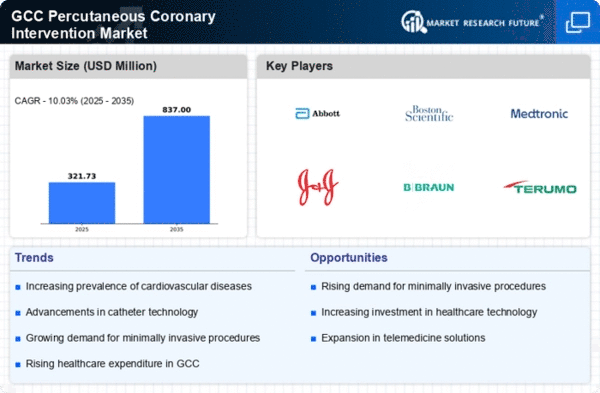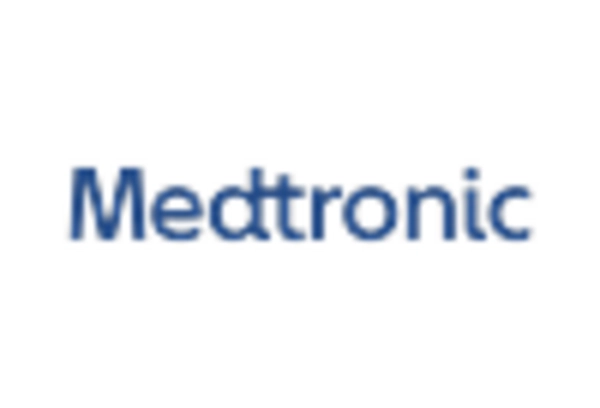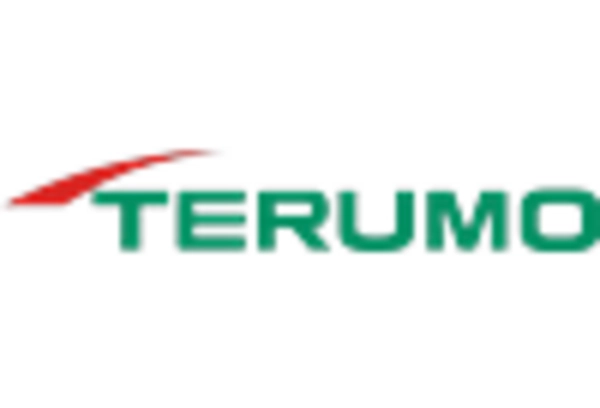Growing Aging Population
The demographic shift towards an aging population in the GCC region is a significant driver for the percutaneous coronary-intervention market. Older adults are more susceptible to cardiovascular diseases, necessitating advanced medical interventions. As the population ages, the incidence of conditions requiring percutaneous coronary interventions is likely to rise. This demographic trend is compounded by the increasing life expectancy in the region, which further elevates the demand for cardiac care. Healthcare providers are adapting to this shift by expanding their services and capabilities in interventional cardiology. Consequently, the percutaneous coronary-intervention market is expected to grow as healthcare systems respond to the needs of an aging population, ensuring that effective treatment options are available.
Government Support and Funding
Government initiatives aimed at improving healthcare infrastructure significantly impact the percutaneous coronary-intervention market. In the GCC, various governments are investing heavily in healthcare systems to enhance service delivery and accessibility. This includes funding for advanced medical technologies and training programs for healthcare professionals. For instance, initiatives to establish specialized cardiac centers are likely to increase the availability of percutaneous coronary interventions. Additionally, public health campaigns aimed at raising awareness about cardiovascular health are expected to drive demand for these procedures. As governments prioritize healthcare spending, the percutaneous coronary-intervention market stands to benefit from increased resources and support, potentially leading to improved patient outcomes and higher procedure volumes.
Advancements in Medical Technology
Technological innovations play a crucial role in shaping the percutaneous coronary-intervention market. The introduction of advanced imaging techniques, such as intravascular ultrasound and optical coherence tomography, enhances the precision of interventions. These technologies allow for better visualization of coronary arteries, leading to improved patient outcomes. Furthermore, the development of new stent designs and drug-eluting technologies has revolutionized treatment protocols. The GCC region is witnessing an influx of these advanced technologies, driven by both local and international medical device manufacturers. As hospitals and clinics invest in state-of-the-art equipment, the demand for percutaneous coronary interventions is expected to increase. This trend suggests that ongoing research and development in medical technology will continue to propel the market forward, making procedures safer and more effective.
Rising Incidence of Lifestyle Diseases
The percutaneous coronary-intervention market is experiencing growth due to the increasing prevalence of lifestyle-related diseases in the GCC region. Factors such as sedentary lifestyles, unhealthy dietary habits, and rising obesity rates contribute to cardiovascular issues. According to recent health statistics, cardiovascular diseases account for a significant portion of mortality in the region, prompting healthcare providers to adopt advanced intervention techniques. The demand for percutaneous coronary interventions is likely to rise as more individuals seek treatment for conditions such as coronary artery disease. This trend indicates a shift towards minimally invasive procedures, which are preferred for their reduced recovery times and lower complication rates. As the population ages and lifestyle diseases become more prevalent, This market is poised for substantial growth in the coming years.
Increased Patient Awareness and Education
Patient awareness regarding cardiovascular health is on the rise in the GCC, positively influencing the percutaneous coronary-intervention market. Educational campaigns and community outreach programs are helping individuals recognize the symptoms of heart disease and the importance of timely intervention. As patients become more informed about their health, they are more likely to seek medical advice and treatment options, including percutaneous coronary interventions. This heightened awareness is likely to lead to earlier diagnoses and increased procedure rates. Moreover, the availability of information through digital platforms and social media is empowering patients to take charge of their health. As a result, the percutaneous coronary-intervention market is expected to benefit from a more proactive patient population, driving demand for these essential medical procedures.
















